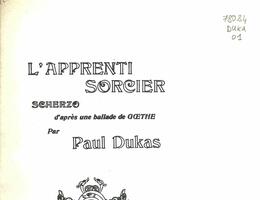L'Apprenti sorcier
Scherzo after a ballad by Goethe.
Throughout the nineteenth century French musicians showed a fascination for German literature, as evidenced by their works inspired by Goethe, Hoffmann or Bürger. Dukas composed two scores inspired by the works of Goethe: his overture to Goetz von Berlichingen (1884) and in 1896-97 the symphonic poem L'Apprenti sorcier. His orchestral “scherzo” (subtitle of the score) was to increase the popularity in France of Goethe’s ballad. Its première at the Société Nationale de Musique on 18 May 1897, with Dukas conducting, L’Apprenti sorcier received a lukewarm reception, however. The audience was no doubt still in shock after the terrible fire at Le Bazar de la Charité (4 May). The work did not meet with success until 19 February 1899, when the Orchestre Lamoureux was conducted at the Cirque des Champs-Élysées by Camille Chevillard. The subtitle “scherzo” refers to the spirit of the work, which is in fact cast in sonata form. The strings, first of all, suggest spells and magic, before clarinets softly enunciate the broomstick theme (later taken by three bouncing and mocking bassoons), and the apprentice’s appearance is evoked in a lively tempo by the woodwinds, playing staccato. The commanding theme of the sorcerer’s spell –which will take on new importance at the end of the score, to signal the master’s return – is heard on muted brass. A gigantic orchestral crescendo represents the water gradually flooding the master’s house. The recapitulation begins when the single broom is split in two; the theme, initially treated in fugato, rushes faster and faster, gradually engulfing the apprentice. The mysterious atmosphere of the beginning returns in the coda, and the work ends with a shattering chord.

